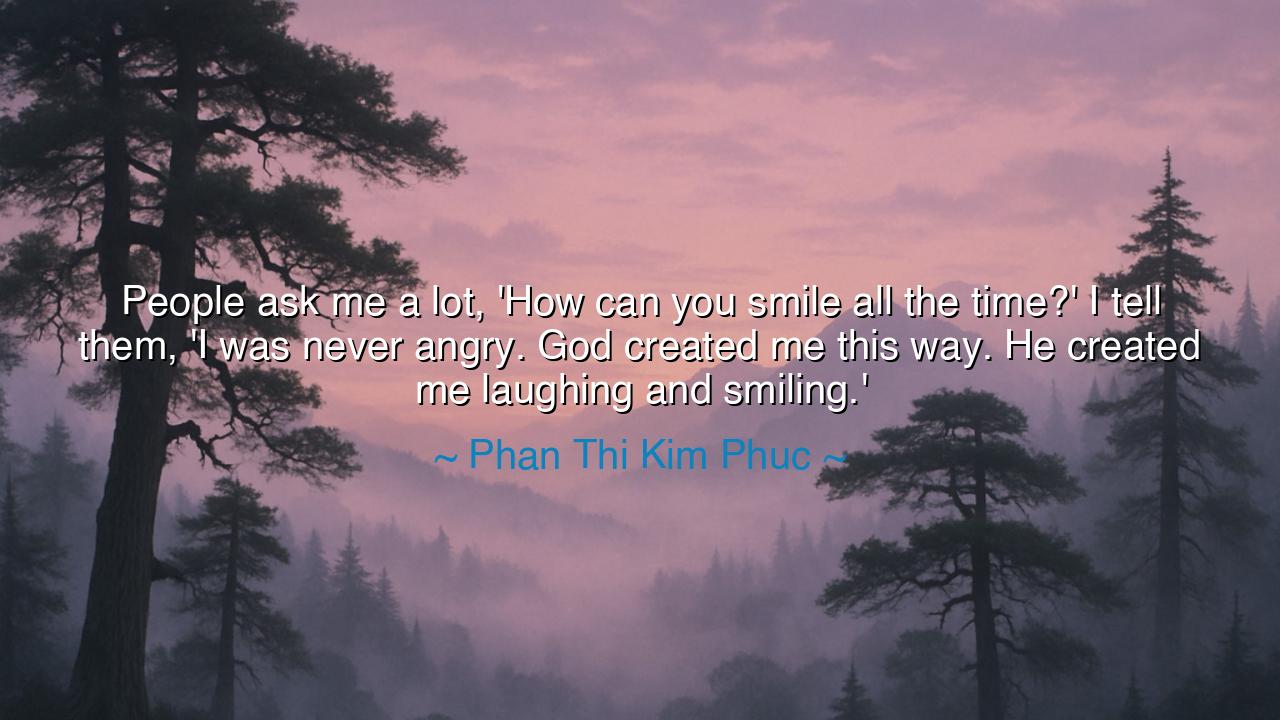
People ask me a lot, 'How can you smile all the time?' I tell
People ask me a lot, 'How can you smile all the time?' I tell them, 'I was never angry. God created me this way. He created me laughing and smiling.'






Hear now the words of Phan Thi Kim Phuc, the woman once known to the world as “the Napalm Girl,” who rose from fire and agony to speak with luminous grace: “People ask me a lot, ‘How can you smile all the time?’ I tell them, ‘I was never angry. God created me this way. He created me laughing and smiling.’” In these words lies a teaching that pierces the heart: that even those who have endured the depths of suffering can rise not with hatred, but with compassion, not with bitterness, but with joy.
For those who know her story remember the photograph that shocked the earth—the child running naked, her skin burned by napalm, her face twisted in pain. The world saw her suffering and despaired. And yet, from those ashes, this same soul now declares that she was created to smile. This is no shallow optimism, but the hard-won triumph of spirit over devastation. To say “I was never angry” is not to deny the reality of pain, but to refuse to let pain harden into hatred.
The ancients spoke of this paradox often. Marcus Aurelius, the philosopher-emperor, endured betrayal, plague, and ceaseless war, yet wrote that the soul must remain serene, unshaken, like a light in the storm. Kim Phuc embodies this ancient wisdom. She bore wounds that could have left her embittered, but instead she became as the lamp that shines brighter after being tested by flame. Her smile is not mere expression—it is testimony, a proclamation of survival and of forgiveness.
And what power forgiveness holds! Many who suffer cling to resentment, believing it gives them strength. But resentment is a chain, a weight upon the soul. Kim Phuc chose instead to laugh, to smile, to release anger, and thereby to be free. Her joy is not weakness, but the highest form of courage. Just as Nelson Mandela emerged from decades of prison without bitterness, so too did she transform tragedy into a message of peace. In her smile lives the power to heal not only herself, but those who see her.
The lesson here is profound: the human spirit is not defined by what it suffers, but by what it chooses after suffering. You may not choose your wounds, but you can choose whether to let them fester into anger or to transform them into compassion. Kim Phuc’s life declares that one may rise from horror with a smile, not because the pain was small, but because the heart is great.
Therefore, O listener, take this teaching into your own life. When anger beckons, remember her words: “God created me this way, laughing and smiling.” Choose not to let bitterness rule you. In the midst of trials, dare to smile, not as denial, but as defiance. Let your smile be your shield, your declaration that hatred will not win. In doing so, you will not only heal yourself, but bring light to those who walk beside you.
Thus the voice of Kim Phuc joins the chorus of the ancients: joy is stronger than sorrow, forgiveness greater than wrath, and a smile more powerful than any weapon of war. Let us remember this, and live not as prisoners of anger, but as children of light, created to laugh, to smile, and to bring peace into the world.






AAdministratorAdministrator
Welcome, honored guests. Please leave a comment, we will respond soon